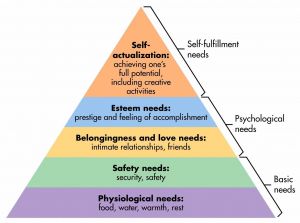Maslow's hierarchy: Difference between revisions
mNo edit summary |
mNo edit summary |
||
| Line 1: | Line 1: | ||
<HTML><iframe width="100%" height="315" src="https://www.youtube.com/embed/HzTl-eS8NGw" title="YouTube video player" frameborder="0" allow="accelerometer; autoplay; clipboard-write; encrypted-media; gyroscope; picture-in-picture" allowfullscreen></iframe></HTML> | <HTML><iframe width="100%" height="315" src="https://www.youtube.com/embed/HzTl-eS8NGw" title="YouTube video player" frameborder="0" allow="accelerometer; autoplay; clipboard-write; encrypted-media; gyroscope; picture-in-picture" allowfullscreen></iframe></HTML> | ||
[[File:Maslows Hierarchy of needs.jpg|alt=Maslow's Hierarchy of needs|thumb|'''Figure 1'''. Maslow's Hierarchy of needs]] | [[File:Maslows Hierarchy of needs.jpg|alt=Maslow's Hierarchy of needs|thumb|'''Figure 1'''. Maslow's Hierarchy of needs]] | ||
'''Everyone is driven to do stuff by a need, | '''Everyone is driven to do stuff by a need, however some needs come before others.''' Maslow, an American psychologist from the early 1900's suggested that there is a defined hierarchy. The idea was that once a lower level is fulfilled a person moves to the next, stage above. If you are hungry you buy some food, if you are thirsty you buy water. Once these '''''basic needs''''' (see Figure 1) are met then you can move up towards psychological needs such as relationships and prestige. | ||
If you are hungry you buy some food, if you are thirsty you buy water. | |||
=== Maslow's Hierarchy and Environmentalism === | === Maslow's Hierarchy and Environmentalism === | ||
In relation to the [[ecological crisis]], a human's basic needs need to be met before they can address these issues. | In relation to the [[ecological crisis]], a human's basic needs need to be met before they can address these issues. | ||
| Line 10: | Line 7: | ||
<HTML><p align="center"><iframe src="https://giphy.com/embed/wRU2aOd8k8OazFb53j" width="100%" height="248" frameBorder="0" class="giphy-embed" allowFullScreen></iframe></HTML> | <HTML><p align="center"><iframe src="https://giphy.com/embed/wRU2aOd8k8OazFb53j" width="100%" height="248" frameBorder="0" class="giphy-embed" allowFullScreen></iframe></HTML> | ||
As about 9.2% of the world, or 719 million people, live in extreme poverty, lacking food, safe drinking water, sanitation facilities, health, shelter, education and information. It is impossible to think that our environmental issues will be faced before drinking water for near a bullion people is solved. | |||
Universal Basic Income, the idea where a central body provides the lower rungs has been shown to decrease mental health issues<ref>Canada’s forgotten universal basic income experiment: https://www.bbc.com/worklife/article/20200624-canadas-forgotten-universal-basic-income-experiment</ref> and allow people to not behave in environmentally destructive work patterns and concentrate on other things. | Universal Basic Income, the idea where a central body provides the lower rungs has been shown to decrease mental health issues<ref>Canada’s forgotten universal basic income experiment: https://www.bbc.com/worklife/article/20200624-canadas-forgotten-universal-basic-income-experiment</ref> and allow people to not behave in environmentally destructive work patterns and concentrate on other things. | ||
'''References''' | '''References''' | ||
Revision as of 00:47, 3 July 2023
Everyone is driven to do stuff by a need, however some needs come before others. Maslow, an American psychologist from the early 1900's suggested that there is a defined hierarchy. The idea was that once a lower level is fulfilled a person moves to the next, stage above. If you are hungry you buy some food, if you are thirsty you buy water. Once these basic needs (see Figure 1) are met then you can move up towards psychological needs such as relationships and prestige.
Maslow's Hierarchy and Environmentalism
In relation to the ecological crisis, a human's basic needs need to be met before they can address these issues.
As about 9.2% of the world, or 719 million people, live in extreme poverty, lacking food, safe drinking water, sanitation facilities, health, shelter, education and information. It is impossible to think that our environmental issues will be faced before drinking water for near a bullion people is solved.
Universal Basic Income, the idea where a central body provides the lower rungs has been shown to decrease mental health issues[1] and allow people to not behave in environmentally destructive work patterns and concentrate on other things.
References
- ↑ Canada’s forgotten universal basic income experiment: https://www.bbc.com/worklife/article/20200624-canadas-forgotten-universal-basic-income-experiment
